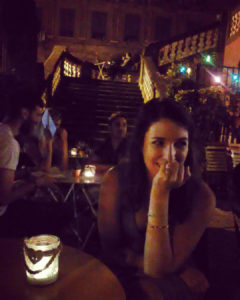SARAH V. SCHWEIG’S “POEM ON MY BIRTHDAY”
Poem On My Birthday
It is almost the darkest day of the year.
We light lights in the dark.
It’s a human thing, my mother would say.
It’s a human thing
that giving something a name
seals it up and stocks it away.
Several times in my life
I’ve changed my name.
Today is my birthday.
For a month, so I’m told, I was
The Baby. I went by nothing,
my parents unable to agree.
Recently, I do not believe
in Freedom. I believe Nature will
demonstrate our unfreedom finally.
I am 35 today and thinking about the idea
of having a child.
We light lights in the dark.
I lost myself, my mother says sometimes,
about many various states of affairs:
a walk with a neighbor,
her marriage. I’m skeptical
of there being a self
that one can lose. Still,
sometimes I try
to point at my life
from the outside.
My husband and I
give each other dozens
of names. Is the question
how can a sound stand for a person?
an absurd question?
Can a word stand for a concept
in the same way a name can stand
for a person? Can a concept
have a life? Can we mourn the death
of a concept? The question isn’t
what exists? The question is what doesn’t
die with us? We light lights
in the dark. It’s a human thing.
A poem as a vehicle of thought: a note on “Poem On My Birthday”
I drafted “Poem on My Birthday” during the very early hours of December 18, 2019, my 35th. I had just completed several months of studying Wittgenstein, specifically the later thinking of the Philosophical Investigations and On Certainty. I had been reading Kripke on the private language argument. I had been reading Cavell.
I went into philosophy to try to understand what was happening in a person’s mind when creating something like poetry. But I’ve noticed that it is almost impossible to really study philosophy and write poetry at the same time. Thinking through philosophical arguments requires a focus that (for me, at least) crowds out the particular focus that leads to poetry. And Wittgensteinian thinking—so close to language in language—can make any gesture toward writing poetry seem like an arbitrary linguistic game. I immersed myself in understanding the arguments. I needed to go deep into them for months before feeling any sort of lack.
Then the thoughts—not wholly “poetic” but not wholly “philosophical” either—came at about 4 o’clock in the morning on December 18, and led to the lines of this poem. After trying to write by hand in my notebook in the dark, I realized I wouldn’t get back to sleep until the thought had been completed. I crept out of the bedroom where my husband was sleeping into the living room to try to decipher the penmarks under the light.
I now think that I could only write this poem’s first draft in a semi-conscious state, to dodge the hyper-consciousness of using language in what ended up being a “poetic” way. Yet I still think this poem contains philosophical thinking. This, however, is not to everyone’s taste. When I sent an early draft to a close friend, she highlighted the lines containing the more abstract questions (Is the question / how can a sound stand for a person? // an absurd question? / Can a word stand for a concept / in the same way a name can stand / for a person? Can a concept / have a life? Can we mourn the death // of a concept?). She said these lines made the poem seem less “at ease with itself,” and suggested cutting them. The thought of those lines being deleted made me realize that they were what I believed to be the real achievement of the poem.
I want clarity of thought, I want beauty, but I do not want ease. I want challenge, struggle, and destabilization of all previous assumptions, but without chaos—like what happens when someone looks at a painting by Francis Bacon for the first time, or when someone encounters a new idea.
“When I think in language,” Wittgenstein writes, “there aren’t ‘meanings’ going through my mind in addition to the verbal expressions: the language itself is the vehicle of thought.”
Read Sarah V. Schweig’s “In the Eyes of the Company” alongside “Poem On My Birthday” featured in the tenth-anniversary issue of the Ocean State Review.
For news and to read more of Sarah V. Schweig’s work visit www.sarahvschweig.com. Order Take Nothing With You from the University of Iowa Press here.

